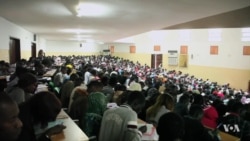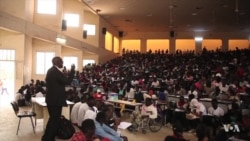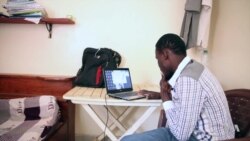The law school lecture hall at Dakar’s Cheikh Anta Diop University (UCAD) is, as usual, packed well beyond its 2,000-person capacity. Students huddle on the floor and perch on the window sills. Others stand by the door, straining to hear the professor.
“If you really want a seat, you need to get here at noon or at 11 a.m. for a class that starts at 3 p.m.,” says second-year student Insa Diop, seated outside. “I’m just going to have to make photocopies of the handout. And for the teacher’s explanations, well, I’ve missed them.”
About 60 percent of the students at UCAD failed their exams last year. Administrators and staff blame overcrowding. For those who do graduate, jobs are far from guaranteed. In fact, people with more than a secondary-school education have the highest unemployment rate in Senegal, according to 2017 government data.
Experts see the higher education sector in crisis across the region.
Bursting at the seams
UCAD has an official capacity of 25,000 students. But there are more than 100,000 enrolled at the school, and UCAD, like other universities across Africa, is facing a looming demographic bulge.
The United Nations estimates that by 2030, about one quarter of the world’s youth aged 15-24 will reside in Africa. The population boom is coupled with a growing number of young people across the continent completing secondary school.
“Higher education systems in Africa are simply not suited to the number of students who have access to university,” said Gilles Yabi, founder of the Dakar-based West Africa Citizen Think Tank (WATHI).
Compared to other parts of the world, sub-Saharan Africa still has the lowest proportion of people in higher education. However, university enrollment in the region has grown dramatically, from barely 400,000 in 1970 to 7.2 million in 2013, according to the World Bank.
Last year, the student-to-lecturer ratio at UCAD was a staggering 158 to 1 for the School of Humanities and 75 to 1 for the Law School.
WATCH: Part 2
“I feel exhausted, even dead if I can say so. But this is the job, and we are driven,” said Professor Oumar Dieye, who teaches French literature at UCAD.
Confronted by persistent protests from both teachers and students, Senegal embarked in 2013 on a $750 million expansion of the higher education system. The project was to take four years but is still ongoing.
“Senegal has taken the bull by the horns,” said Youssouf Ouattara, higher education project coordinator for the U.N. Cultural Organization (UNESCO) in West Africa. He said Senegal is an example for the region, but he fears the reform is coming too late. “We would have wanted to see the same efforts start 18 years ago,” he said.
The government is expanding existing campuses, including UCAD, and building two new universities outside Dakar, scheduled to open this fall. More teachers have been recruited, and a virtual university was set up in 2014.
But the changes aren’t coming fast enough for students.
The employment disconnect
In Dakar, it is not uncommon to find, as VOA did, a chemistry major selling second-hand clothes on the street or a finance graduate managing a used furniture depot.
“There is this incompatibility between the content of university programs and the needs of the economy. Young people going into higher education expect a higher quality of life and easier access to jobs, but in many [African] countries they are actually more likely to be unemployed,” says Yabi. “There will be major crises if reforms are not implemented, especially if students do not see concrete results.”
In Senegal, employment is concentrated in three sectors – nearly half in agriculture, followed by the service sector and industrial occupations such as construction and mining.
Yet over a third of students at UCAD, the largest public university, are studying humanities.
WATCH: Part 3
“We are not giving young people proper guidance. They are left in the hands of parents and family who push them towards classic career paths,” said Aminata Sall Diallo, who heads a Senegalese government task force helping university graduates find work.
The government plans to open technical training schools in each of Senegal’s 14 regions. One of the new universities under construction will specialize in agriculture; the other will be devoted to fields such as electro-mechanics, aeronautics and land management.
Experts say this practical approach must begin much sooner, at the primary and secondary school levels.
“Higher education alone will not be able to meet the diversity of market demands,” said UNESCO’s Ouattara.
Nearly half of Senegal’s current population is younger than 14 years of age. Some warn of a ticking time bomb, but the head of UCAD, Chancellor Ibrahima Thioub, remains an optimist.
“The mass influx of young people into schools and universities is a good thing for African countries,” he told VOA. “We can transform this into a lever for development so long as we play our cards right.”









